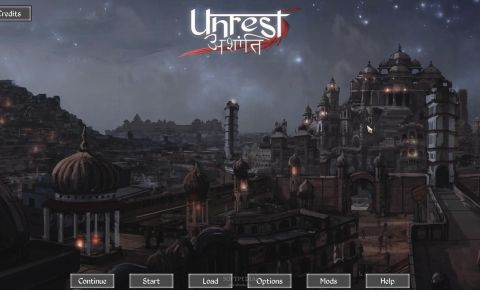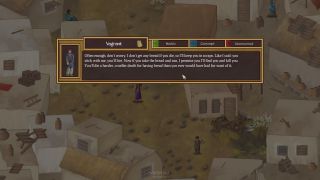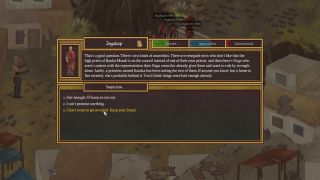Unrest is yet another small-scope title coming from indie developer Pyrodactyl games, who this time wants to treat us to a more meaty offering.
The game's premise is far from the usual "fulfill your destiny" fluff that fantasy games and novels have abused throughout the years, instead opting to cast a revealing glance into the lives of everyday folk and see how things that are bigger than us tug at our minds and push us in different directions, and how those directions shape our lives and the lives of those around us.
Unrest offers you a pretty novel perspective, putting you in the shoes of several different people, and showing you the same events from multiple perspectives, in order to paint a better picture of what's going on, and to make you aware of the responsibility that comes with your actions.
Furthermore, the game is not afraid to delve into more controversial topics such as racism, greed, poverty, violence, change, long-standing and completely absurd traditions, xenophobia, the trade-offs that people make in order to gain a sense of security or hope for a better future, in a pretty organic and insightful manner. You know, all that nice stuff.
You get to see things from more than one side, and you experience every party's plight, which makes everything much more difficult to stomach because you can't easily paint a target on the bad guys, salute the flag, ride off into the sunset and be done with it.
If Unrest's main goal is to build up tension, then it does its job masterfully. You begin your journey on the cusp of an uprising in a former glorious city whose luck has turned sour after a prolonged drought drove its people to the brim of starvation.
The Naga Empire, a much stronger force than the city of Bhimra, imposes a trade agreement that not many agree with, even though it may end up being for the best interest of both parties, in the long run.
You get to explore the starving slums of an ancient, fantasy interpretation of India, playing as a series of ordinary people struggling to adapt and survive within the city-state, getting intimate with the fragile balance of power that several powerful individuals are attempting to maintain through every means necessary.You get to see the impact of every action on ordinary citizens, and to see that nothing is what it seems at first, and that there is ulterior motive and coercion in every move, and when your very existence is on the line, adhering to the moral high ground is not as easy as when you blindly follow the orders of superiors when invading another sovereign country.
For instance, when you take on the role of a priest who recently changed the temple he was serving, you have the option to steal from the donations collected from merchants and bribe some guards in order to grant your wife and two young children protection, which is easy to refuse when you don't have the money.
But after witnessing how the head priest uses donations as a form of extortion, in order to keep a military contingent well fed, to protect the wealthy citizens in the event of an uprising, when you see that the merchants themselves see donations as a tax to do business without anyone meddling in their trade, and when even the Naga merchants pay the tax in order to get on the head priest's good side, even though the resources are used against their own kind, things get a little blurry.
Roaming the city streets, you catch wind of growing unrest, suggesting that the dwellers of the slums might rebel due to starvation. You realize that you and your family might be in danger, and the armed thugs only care about who is keeping them well fed. Now, returning with the sizable "donations" collected from the wealthier citizens, and with the knowledge of the inner workings of the city, it's becoming harder and harder to uphold your vow of poverty.
When you take on the role of a young princess whose parents were brutally murdered and an opportunist merchant offers you an armed escort of his men, most likely looking to assassinate you at the right time and seize power for himself, you can order the men to kill him in exchange for more gold than they are already paid, and they do it on the spot, revealing the true nature of the world you are attempting to appraise.
It's through this kind of incremental reveal of the burdens and dilemmas that the dwellers of Bhimra face that Unrest lures you in, and the gritty realism and heartfelt stories offered to you, the difficult choices that shape the future of the people you're in control of will fascinate and haunt you long after you have put the game down.
Although it's built on the skeleton of a classic role-playing game, Unrest rarely resorts to violence, your weapon of choice being dialogue. There are no mythical beings, no mystical quest to become a hero, just a perpetual struggle, where the choices that make one character's life easier make another one's harder.
Although the visuals are not exactly stunning, the hand-drawn environments and characters do their job of carrying the story, which is by far the game's strongest point.
The music has a very eerie sound if you're not used to the instruments, and its somber, even sad, demeanor offers a fitting aural background to your struggles. In any case, the instrumental pieces are elaborate enough so that they don't feel repetitive, and offer more depth to your adventure, as well as a sense of suspense.
My only gripe with the game is its short span, as you can be done with it in just a couple of hours. Fortunately, the game also has a considerable replay potential, as it makes you curious about what would have happened should you have chosen to take a different path at one point or another.
The Good
- Tackles challenging ethical dilemmas
- Well written
- Mature and realistic
- Offers a completely new experience, from a novel point of view
The Bad
- Very short
- Characters walk slowly and weirdly
Conclusion
It proposes ethical dilemmas that don't have obvious solutions and calls for a lot of internal struggle, because its feet are firmly planted in social quandaries that we still have not been able to fully solve, and are still nibbling at the backs of our minds.
 14 DAY TRIAL //
14 DAY TRIAL // 















